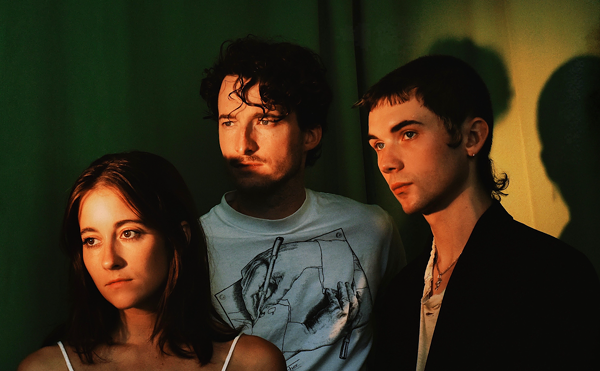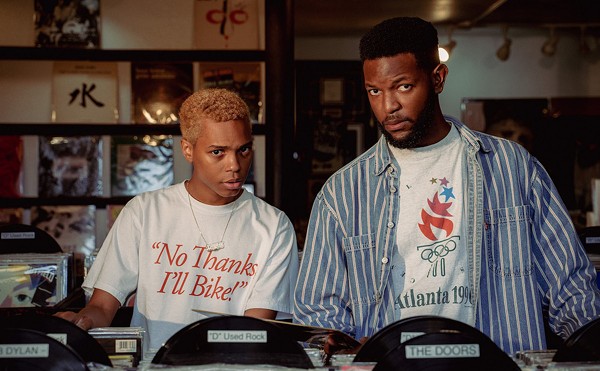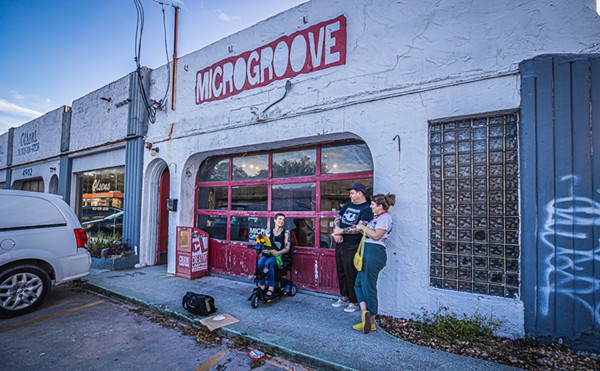To The 5 Boroughs
BEASTIE BOYS
Capitol
When the snotty, simple and absurd Licensed to Ill emerged in 1986, it had all the classic hallmarks of one-hit-wonderdom. Nobody was surprised that the first white hip-hop crew to achieve pop-culture ubiquity was doing something that superficially qualified as novelty, and few expected to ever hear from them again.
But following the initial apathy that greeted their visionary sophomore outing Paul's Boutique, the Beastie Boys spent the next dozen years as one of rap's most beloved and versatile acts. They could be psychedelic, or juvenile, or deep, or funky, or punk, or stoned, and it all worked for them. The through-line, and best part of any Beastie Boys record, though, has always been the multitude of eccentric, engaging lyrical snippets that seem to flow from the speakers directly into the listener's brain.
To The 5 Boroughs finds the trio at its most politically outspoken, and its most straightforward, in a hip-hop sense. It also finds the group resting on its laurels more than a little bit. Which would be fine, were the album packed with the aforementioned vocal treasures, which it isn't, or at least boasting its share of odd and big, crazily funky rhythms, which it doesn't.
It seems as if, while stripping things back to the basic elements, the group ignored their basic elements, the things that made them Beastie Boys to begin with. Six years after your last record is NOT the time to neglect putting your best foot forward. They've done just that, and the result is a competent but largely forgettable record, their weakest to date.
The group's energy and natural talent breaks through occasionally — most noticeably on groovy, effortlessly arrogant old-school tracks "3 The Hard Way," "Triple Trouble" and "Hey Fuck You" — but most of the interplay on 5 Boroughs just barely surpasses monotony. (And when they get pointedly political, as on "Time to Build," it's just awful.) The rhythms and production are also often subdued and workmanlike, two words that should never be used to describe Beastie Boys material.
To The 5 Boroughs was obviously intended in places to reflect the seriousness of the times, and that's admirable. It's just as obvious, however, that that's not where these men's talents lie. It's also not what we need from them — what we need from them is fun, cleverness, distraction. On that front, the new disc isn't a total loss, but it will certainly inspire many to wonder if the Beastie Boys have grown up so much that they've finally grown irrelevant. 

—SCOTT HARRELL
Seven Steps: The Complete Columbia Recordings of Miles Davis, 1963-1964
MILES DAVIS
Columbia/Legacy
Seven Steps is the eighth release in an exemplary series of Miles Davis boxed sets that document his Columbia years. The seven-disc collection captures the mercurial trumpeter in a transitional state. After his historic work with Coltrane, and before the rise of his great '60s quintet, he searched for the right combination of players, while sticking mostly to his tried-and-true book of select originals and standards. He was also in the midst of a feud with producer Teo Macero, and thus gave the label mostly live material during 1963-'64. The first disc-and-a-half features studio work; two new tunes by short-tenured Miles pianist Victor Feldman ("Seven Steps to Heaven," "Joshua") anchor the sessions, which are solid, but a tad staid. The rest of the compilation tracks the rapid development of a new, soon-to-be-revered rhythm section: drummer Tony Williams, pianist Herbie Hancock and bassist Ron Carter. The saxophone slot was another matter: George Coleman's four-square perfectionism never quite jibed with the young, exuberant unit; Sam Rivers, who would go on to become a major figure in the late '60s/early '70s avant-garde scene (and is still kickin' it at nearly 80), was too free-spirited. The answer came in the form of Wayne Shorter. Disc seven captures the fabled quintet's first recorded work at a concert in Berlin; right from the jump, the saxophonist's influence is palpable — the band is more rhythmically pliant and harmonically daring. Most of the material on Seven Steps has been released over the years, but here the live sets are reconstructed in their original form, which enhances the music's flow. (For you Miles fiends, the set unveils a grand total of 11 previously unreleased tracks; also, three previously edited tunes have been restored to their original lengths.) Seven Steps may not include music that is as historically significant as other Miles boxes, but it still brims with vitality, and allows the careful listener to home in on one of Miles' bumpy but fruitful phases. 


 1/2
1/2
—ERIC SNIDER
Diaspora Hollywood
STEVEN BERNSTEIN
Tzadik
The irrepressible leader and slide trumpeter of Sex Mob turns out to have a more contemplative side. His third Diaspora installment (following Diaspora Blues and Diaspora Soul) pays homage to the first wave of Hollywood composers and orchestrators, many of whom were immigrant Jews from New York City, some who had come straight from Europe. Far from being show music, Diaspora Hollywood is a seductive set of traditional Jewish songs, a handful of originals and a couple of cantorial pieces. By and large, the mood is haunting, the performances restrained. Bernstein, whose signature sound is the uber-brassy slide trumpet, takes a more restrained tack on his solos, and shows he can play with sensitivity on valved trumpet and flugelhorn. His fellow travelers are an intriguing lot: multi-reedman Pablo Calogero; vibraphonist D.J. Bonebrake; bassist David Piltch; and drummer/percussionist Danny Frankel. Many of the songs sound like minor-key blues, and even with the small ensemble, Bernstein manages to conjure up strains of Ellington, Mingus and others. Despite its exotic concept, Diaspora Hollywood is an altogether original jazz album. 



—ERIC SNIDER
Everybody Loves a Happy Ending
TEARS FOR FEARS
New Door/Universal
Of all the mid-'80s post-new wave MTV bands, I thought Tears for Fears had the most staying power. If "Everybody Wants to Rule the World" comes on the radio, I'm turnin' it up. Still, I couldn't have predicted this: Everybody Loves a Happy Ending, the first TFF album since 1996 and one that sees Curt Smith (high voice, short hair) returning to the fold after 14 years, is terrific. The disc is chock full of grabby melodies in the Beatles tradition. The production is huge, brimming with lush vocal harmonies and intricate, swirling arrangements that pour from the speakers. Roland Orzabal's lead singing remains thick and soulful. Here's to happy new beginnings. 



—ERIC SNIDER
















